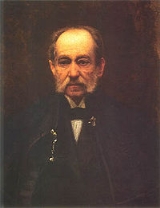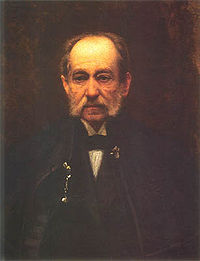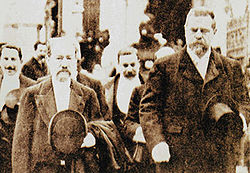
Abdón Cifuentes
Encyclopedia

Chile
Chile ,officially the Republic of Chile , is a country in South America occupying a long, narrow coastal strip between the Andes mountains to the east and the Pacific Ocean to the west. It borders Peru to the north, Bolivia to the northeast, Argentina to the east, and the Drake Passage in the far...
's most significant Catholic politicians in the nineteenth century.
He was the son of José Maria Cifuentes Olivares and Paula Espinoza Pinto in San Felipe, Chile
San Felipe, Chile
San Felipe is a commune and the capital city of the San Felipe de Aconcagua Province in central Chile's Valparaíso Region. It is located north of the national capital of Santiago...
. He married Luz Gómez, with whom he fathered 13 children. Cifuentes attended the Instituto Nacional
Instituto Nacional
Instituto Nacional , founded on August 10, 1813 by the Chilean patriot José Miguel Carrera , officially Liceo Ex A-0 - Instituto Nacional General José Miguel Carrera, is Chile's oldest and most prestigious school...
(National Institute) and then studied law at the Universidad de Chile (University of Chile), receiving his law degree in 1861. Cifuentes went on to become a professor at the Colegio San Luis and then the Instituto Nacional. In 1882, he was named a member of the Faculty of Philosophy
Philosophy
Philosophy is the study of general and fundamental problems, such as those connected with existence, knowledge, values, reason, mind, and language. Philosophy is distinguished from other ways of addressing such problems by its critical, generally systematic approach and its reliance on rational...
& Humanities
Humanities
The humanities are academic disciplines that study the human condition, using methods that are primarily analytical, critical, or speculative, as distinguished from the mainly empirical approaches of the natural sciences....
of the Universidad de Chile, and in 1889 he became professor of constitutional rights at the Pontifical Catholic University of Chile
Pontifical Catholic University of Chile
The Pontifical Catholic University of Chile is one of the six Catholic Universities existing in the Chilean university system and one of the two Pontifical Universities in the country, along with the Pontifical Catholic University of Valparaíso. It is also one of Chile's oldest universities and...
.
Because of the perceived need for Catholic elements to combat liberals in the press, Cifuentes made contributions to various Chilean periodicals. Together with his former student and fellow Catholic intellectual Zorobabel Rodríguez
Zorobabel Rodríguez
Zorobabel Rodríguez Rodríguez was a Chilean boxer who competed in the 1924 Summer Olympics.In 1924 he was eliminated in the first round of the lightweight class after losing his fight to the upcoming gold medalist Hans Jacob Nielsen.-External links:*...
, Cifuentes founded the daily newspaper El Independiente (The Independent) in 1864. In 1867, Cifuentes helped form the Sociedad de Amigos del País (Society of Friends of the Country) and in 1883 he was one of the founders of the Unión Católica de Chile (Catholic Union of Chile).

Rancagua
Rancagua is a city and commune in central Chile, part of the Rancagua conurbation. It is the capital of the Cachapoal Province and of the O'Higgins Region, located south of the national capital of Santiago. It had a 2002 population of 214,344...
in 1867 and was reelected five times. In 1892, he was elected Senator of Llanquihue
Llanquihue
Llanquihue may refer to:*Lake Llanquihue, the second largest lake in Chile*Llanquihue Province, a province of Chile located in the southern Los Lagos Region*Llanquihue, Chile, a Chilean commune and city in Llanquihue Province, Los Lagos Region...
in 1892, Aconcagua
Aconcagua
Aconcagua is the highest mountain in the Americas at . It is located in the Andes mountain range, in the Argentine province of Mendoza and it lies west by north of its capital, the city of Mendoza. The summit is also located about 5 kilometres from San Juan Province and 15 kilometres from the...
in 1894, and then Santiago
Santiago, Chile
Santiago , also known as Santiago de Chile, is the capital and largest city of Chile, and the center of its largest conurbation . It is located in the country's central valley, at an elevation of above mean sea level...
in 1904. In 1871, Abdón Cifuentes was appointed Minister of Public Instruction by President Federico Errázuriz Zañartu
Federico Errázuriz Zañartu
Federico Marcos del Rosario Errázuriz Zañartu was a Chilean political figure. He served as the president of Chile between 1871 and 1876. He was born in Santiago in 1825 and died there in 1877. Errázuriz was of Basque descent....
, in which role Cifuentes proposed that state schools refrain from holding exams from private schools (mostly Catholic) and that such tests be carried out in the colleges themselves. It was signed into law January 15, 1872, and caused a strong reaction from lay professors.
On January 30, 1872, he signed another law that granted the right to students to study separate branches of law. This attitude greatly troubled the director of the Instituto Nacional, Diego Barros Arana
Diego Barros Arana
Diego Jacinto Agustín Barros Arana was an educator, diplomat and Chilean historian. He is considered the most important Chilean historian of the 19th century and his most famous work is the General History of Chile...
, whom Cifuentes wanted to remove from power, though he was only able to sack part of Barros' faculty. After the students of the Instituto Nacional became disorderly, Barros resigned. The faculty was shaken, and Cifuentes closed the school momentarily to try to reestablish order. His actions in this ordeal were questioned in the congress by Guillermo Antonio Matta, who proposed in 1873 that Cifuentes resign from his post.
Cifuentes also participated in the composition of the act of deposition of President
President of Chile
The President of the Republic of Chile is both the head of state and the head of government of the Republic of Chile. The President is responsible of the government and state administration...
José Manuel Balmaceda
José Manuel Balmaceda
José Manuel Emiliano Balmaceda Fernández was the 11th President of Chile from September 18, 1886 to August 29, 1891. Balmaceda was part of the Castilian-Basque aristocracy in Chile...
in 1891, although he was not able to swear the oath as he was not in Congress at that time, and so Cifuentes administered the oath to the signatories. In 1919, Cifuentes was awarded the Order of St. Gregory the Great
Order of St. Gregory the Great
The Pontifical Equestrian Order of St. Gregory the Great , was established on September 1, 1831, by Pope Gregory XVI, seven months after his election.It is one of the five orders of knighthood of the Holy See...
by the Vatican, the highest honor that a layman can attain. He died on April 14, 1928 in Santiago.

